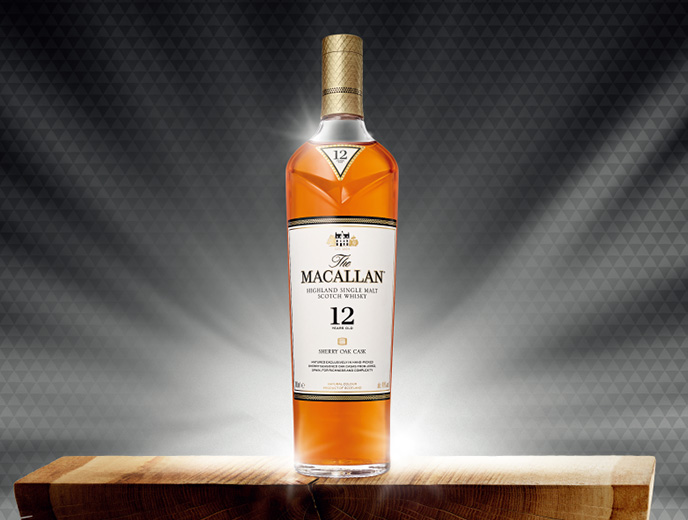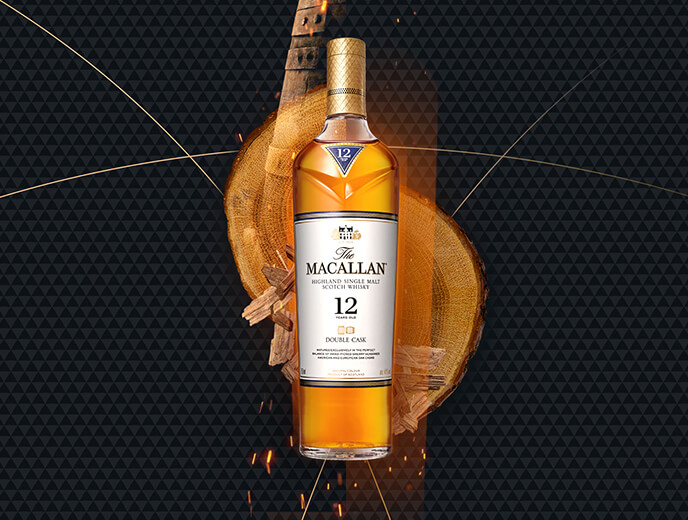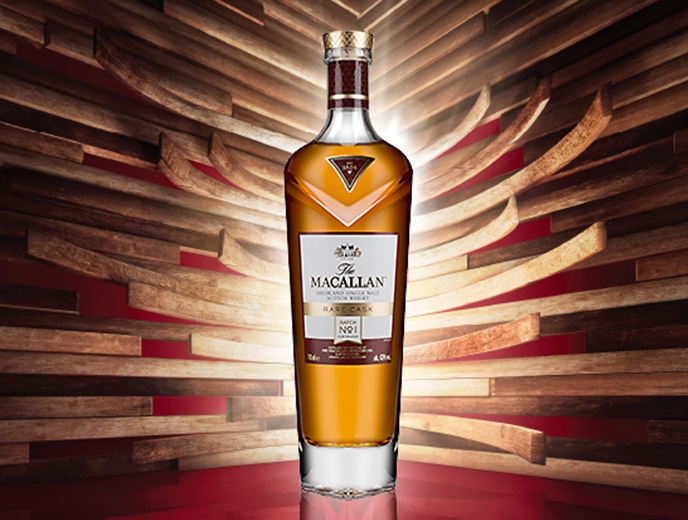Introduction
The Macallan is a type of Scotch whisky produced in the Speyside region of Scotland. Its history dates back to 1824 when it was founded by Alexander Reid. Since then, The Macallan has gained high acclaim and has been loved by many whisky enthusiasts.
Features
Located in the Speyside region, which is known for its excellent whisky production, The Macallan continues to create whisky with a distinctive flavor and color imparted by sherry casks. With its exquisite and rich taste, The Macallan is renowned for its elegance and richness as a single malt whisky. As the second distillery to be granted a distillation license in the Highland region, this long-established brand continues to captivate people worldwide with its aromatic flavors.
Product Introduction
The Macallan Sherry Oak
The Sherry Oak series is known for its glamorous and luxurious taste, which represents The Macallan. It is made using only the original whisky aged in sherry casks that are carefully selected and managed by the company from the selection of the trees to the barrel production.

The Macallan Double Cask
This series is crafted by vatting whisky aged in European oak sherry casks and American oak sherry casks for at least 12 years. It retains the characteristic richness of The Macallan while offering a smooth and balanced flavor with a touch of sweetness.

The Macallan Triple Cask
Whisky aged in European oak sherry casks, American oak sherry casks, and bourbon casks are expertly vatted in this series. It offers a smooth and delicate flavor with a well-balanced profile.

The Macallan Rare Cask
This luxurious whisky is made using 16 carefully selected sherry casks, including those aged for over 30 years. Named "Rare Cask" due to its use of numerous rare casks, it is a beautiful and luxurious masterpiece.

History
Uncompromising Dedication for Nearly 190 Years
The Macallan Distillery, located in the renowned Speyside region of Scotland, is one of the most prestigious distilleries. It was established in 1824 by Alexander Reid, who obtained the second distillation license in the Highland region, allowing legal distillation. The distillery's history dates back even further, as the area was already known as the Macallan parish in the early 18th century. The water of life from Macallan Farm gradually gained popularity among cattle herders who crossed the shallow Clayhagie ford to sell their cattle in the city, spreading the reputation of Macallan.
Leadership Overcoming Adversity
In 1914, with the outbreak of World War I, companies were forced to combine their military and manufacturing capabilities. In such a challenging time, Dr. Alexander Harbinson, who served as the Managing Partner and Trustee of Kemp Trust, took command of The Macallan. Kemp Trust was established to maintain the family's leadership and spirit in Macallan after the death of Roderick Kemp, the owner of Macallan. The fact that The Macallan can maintain its brand value is due to the exceptional leadership and spirit inherited from Kemp.
Uncompromising Spirit that Does Not Allow Compromises
During turbulent times, Kemp Trust did not accept any compromises that would lead to a decline in quality, from distillery management to whisky production. Dr. Harbinson checked the condition of the barrels in the warehouse every week, constantly verifying if they met strict standards. They also maintained strict control over the procurement of raw materials and promptly demanded refunds from suppliers who delivered low-quality barley. The quality of the whisky could not be compromised due to the war.
Perseverance in Operation During Wartime
With many employees enlisting during the war, the company faced a shortage of personnel. Production decreased by 30%, and when The Macallan could not provide whisky, alternative products were recommended. However, they did not temporarily cease operations or compromise the quality of the whisky by using low-aged distillates. Despite the challenging circumstances, they continued to pursue whisky production in the same manner as before, maintaining the quality that had begun to be recognized. This unwavering stance is one of the reasons why The Macallan exists today as an unparalleled brand.
Unyielding Spirit That Shines in Difficult Times
With the declaration of World War II in 1939, the whisky industry faced worsening conditions. The government began to regulate the production and sale of whisky. The cause was the diversion of barley stocks for alcohol distillation to food supply for the nation. In fact, whisky distillation was legally prohibited from 1940 until the end of 1944. The industry was affected by the rationing system, and the price of grains skyrocketed, forcing the purchase of expensive raw materials. Nevertheless, The Macallan maintained the high-quality standards it had begun to be recognized for, even during these challenging times.
Protecting the Quality of Whisky with Pride
Despite facing numerous difficulties and significant external pressure, Kemp Trust continued to protect the quality of The Macallan whisky. They continued to maintain the insight that it was better to preserve valuable stock rather than sell it immediately. Even during difficult times, they did not rely on external investments to maintain whisky distillation as a family business.
Reflecting on the Heartland of Macallan
The Macallan Estate, located in the Speyside region of Scotland, is home to the unique symbol known as Easter Elchies House. This building, which still retains its original appearance, is a valuable asset that The Macallan has inherited and is responsible for passing on to future generations. The inscription "Back to 1700" at the entrance reveals the history associated with the land of Speyside. The building was constructed by Colonel John Grant, a renowned figure in this area, on a picturesque hillside overlooking the upper reaches of the River Spey.
The Macallan's Present Is Inseparable from This Symbol
Easter Elchies House is valuable because it carries memories associated with the land of Speyside within the building itself. When the Macallan family purchased the house in the 1960s, it was in such poor condition that it was considered for demolition as it could not be used as a distillery. However, its importance as a symbolic building is evident from the significant investment made to preserve it. Easter Elchies House, which has been cherished as a symbol of The Macallan, continues to be a source of inspiration for the people working at the distillery, supporting their spirits and driving further development.